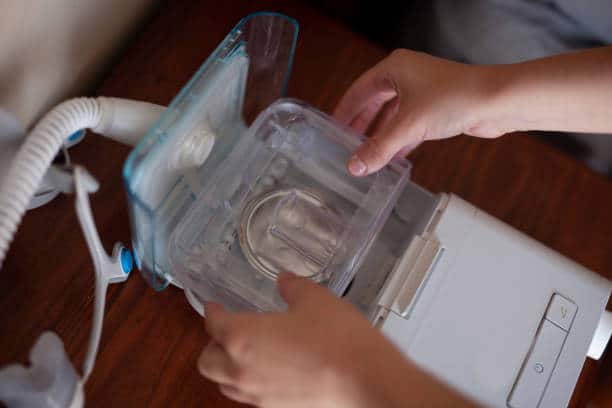If you or a loved one suffer from sleep apnea, you may have heard of CPAP therapy as a potential solution. But what exactly is CPAP therapy, and why is it so important for those with sleep apnea?
Studies have found that regular CPAP therapy can reduce or even eliminate sleep apnea symptoms, such as loud snoring, gasping for air, and daytime sleepiness. CPAP therapy also reduces the risk of heart disease and stroke from sleep apnea. If you’re contemplating CPAP therapy for yourself or a loved one, learn about its benefits and how to start.
In this blog post, we’ll dive into the basics of CPAP therapy for sleep apnea, including its science, benefits, and common concerns. By the end, you’ll have a comprehensive understanding of this potentially life-changing treatment option and be ready to take the next steps toward better and treating sleep apnea and overall health.
Understanding CPAP Therapy

CPAP therapy is a common treatment for obstructive sleep apnea (OSA), which causes breathing pauses during sleep due to a blockage in the airway. The CPAP machine delivers a constant flow of air pressure through a mask worn over your nose, nose, and mouth. This pressure helps keep your airway open, allowing you to breathe normally and reducing the frequency and severity of breathing pauses.
The CPAP machine consists of several parts, including a motor, a hose, and a mask. The motor blows air into the hose connected to the mask. The mask is worn over your nose or nose and mouth, and the air pressure from the machine helps keep your airway open. The pressure setting is determined based on the results of a sleep study, which measures the severity of your OSA and the amount of pressure needed to keep your airway open.
CPAP therapy typically involves a sleep study to diagnose OSA and determine the optimal pressure setting for the machine. The machine and mask are then prescribed by a healthcare provider and are available for purchase or rental through medical equipment suppliers.
Also Read: How Sleep Position Can Improve CPAP Therapy for Sleep Apnea
The Basics of Sleep Apnea
Sleep apnea is a sleep disorder characterized by interruptions in breathing during sleep. These interruptions are caused by a narrowing or complete collapse of the airway, which can result in reduced or stopped airflow to the lungs. As a result, the body is briefly deprived of oxygen, which triggers the brain to partially or fully wake up to restore normal breathing.
Here are the types of sleep apnea:
- Obstructive Sleep Apnea (OSA) – This is the most common type of sleep apnea, and it occurs when the muscles at the back of the throat fail to keep the airway open. The resulting blockage can cause loud snoring, gasping, or choking during sleep.
- Central Sleep Apnea (CSA) – This type of sleep apnea is caused by a malfunction in the brain’s respiratory control center. In CSA, the brain fails to send proper signals to the muscles responsible for breathing, resulting in paused or reduced breathing during sleep.
- Complex Sleep Apnea Syndrome (CompSA) – This relatively rare type of sleep apnea occurs when an individual with OSA begins CPAP therapy and experiences a transition to CSA.
- Positional Sleep Apnea (POSA) – This type of sleep apnea is characterized by an increase in apnea events when sleeping in certain positions, typically on the back. It can often be treated by positional therapy, such as using a special pillow or sleep position trainer.
Sleep apnea can affect people of all ages, but it is most commonly found in adults over 40 years old, particularly those who are overweight or obese. Other risk factors include a family history of sleep apnea, smoking, and alcohol consumption.
Benefits of CPAP Therapy
CPAP therapy for sleep apnea has several benefits. including:
- Improved sleep quality.
By keeping your airway open and preventing breathing pauses, CPAP therapy can improve the quality of your sleep. This can lead to better overall health and well-being and reduced daytime sleepiness and fatigue.
- Reduced risk of complications.
OSA is associated with several health complications, including high blood pressure, heart disease, stroke, and diabetes. CPAP therapy can help reduce the risk of these complications by improving breathing and oxygenation during sleep.
- Better mood and mental health.
Poor sleep quality can contribute to depression, anxiety, and other mental health issues. By improving sleep quality, CPAP therapy can help improve mood and overall mental health.
Also Read: Longterm Benefits of Using a CPAP
Common Concerns of CPAP therapy

CPAP therapy can be a highly effective treatment for sleep apnea, but it’s not uncommon for people to have concerns or questions about using a CPAP machine. Here are some common concerns that people treat sleep apnea may have about CPAP therapy:
1. Discomfort or irritation from the mask.
Some people may experience discomfort or irritation from wearing the CPAP mask, particularly around the nose or mouth. This can be addressed by trying different mask types or adjusting the fit of the mask.
2. Difficulty falling asleep or staying asleep with the machine.
Some people find it hard to get asleep or stay asleep with a CPAP machine on. This can be addressed by practicing good sleep hygiene habits and following a consistent bedtime routine.
3. Feeling claustrophobic or anxious with the machine.
Some people feel claustrophobic or anxious when they have to wear a mask or are hooked up to a machine. This can be addressed by working with a healthcare provider or therapist to develop coping strategies or exploring alternative treatments.
How to Get Started with CPAP Therapy
If you have been diagnosed with sleep apnea and your healthcare provider has recommended CPAP (Continuous Positive Airway Pressure) therapy, here are the steps to get started:
Get a prescription for a CPAP machine
CPAP machines are considered medical devices and require a prescription from a healthcare provider. Your healthcare provider will typically conduct a sleep study to determine the appropriate pressure settings for your machine.
Choose a CPAP machine and CPAP mask
Many different types of CPAP machines and masks are available, so working with a durable medical equipment (DME) provider is important to find the right one for you. Consider comfort, ease of use, and noise level when selecting your machine and mask.
Learn how to use the CPAP machine
Your DME provider should provide you with thorough instructions on how to use your CPAP machine, including how to properly fit and wear the mask, adjust the pressure settings, and clean and maintain your CPAP devices.
Start using the CPAP machine during sleep
It may take some time to adjust to using the CPAP machine during sleep, but using it consistently and as your healthcare provider recommends is essential. Over time, you should notice improved sleep quality and overall health improvements.
Follow up with your healthcare provider
Your healthcare practitioner should check in on you periodically to make sure your CPAP therapy is still working. Your healthcare provider may also make adjustments to your machine settings as needed.
Frequently Asked Questions
What are the side effects of CPAP therapy?
CPAP therapy is safe and well-tolerated, however some users may have dry mouth, nasal congestion, skin irritation, or mask discomfort. A heated humidifier or machine or mask modifications can usually fix them.
Do I have to use CPAP every night?
Consistent use of CPAP therapy is important for maximum benefit. While occasional missed nights may not have significant effects, regular use is recommended to maintain the benefits of therapy. If you have difficulty using CPAP every night, talk to your healthcare provider about strategies to improve adherence.
Can CPAP therapy be used for snoring?
Simple snoring, produced by airway soft tissue vibration rather than obstruction, is rarely treated with CPAP. However, some users may find that the therapy reduces snoring and improves breathing.
Conclusion
Sleep apnea treatment with CPAP is highly effective and can enhance sleep quality and health. Keeping your airway open with a CPAP machine helps prevent apnea occurrences and improve your sleep.
If you have been diagnosed with sleep apnea, you should discuss CPAP therapy with your healthcare provider. With the right equipment and proper use, CPAP therapy can be a game-changer for sleep apnea patients.
Investing in your sleep health with CPAP therapy can improve overall health and well-being. So don’t wait, take the first step today and explore CPAP therapy as a treatment option for sleep apnea.
Enhance your CPAP experience with our top-quality accessories – visit our Amazon store and find the perfect additions to your CPAP setup.




